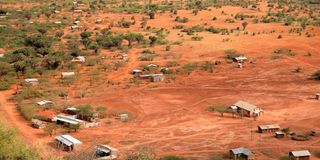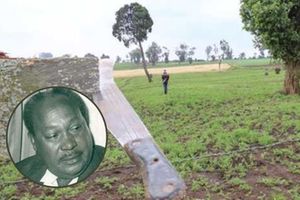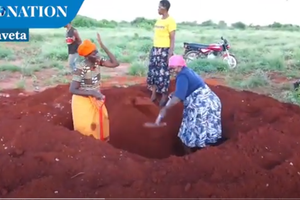
A village in Taita Taveta County.
At the height of the 1997-1998 El-Niño weather phenomenon in Kenya that caused massive floods and landslides, a number of families in Taita Taveta County found solace after the government relocated them to safer grounds.
The families that have since expanded with new generations have called the place home throughout the years.
However, these residents who currently number in the thousands are now facing eviction.
This is after the Environment and Land Court in Voi declined to declare them owners of the land parcel measuring over 2,500 acres.
While some say they were relocated to the property in question by the government during the 1997 El-Niño period, others claim they were born on the land in the 1950s and have called the place home ever since.
The 460 petitioners filed a case in 2020, seeking to be declared owners of the parcel known as LR No 10287/3 by way of adverse possession, arguing that they had lived there uninterrupted for more than 15 years as provided for in law.
However, Justice Edward Wabwoto dampened their hopes of ever owning the expansive land after dismissing their case on grounds that one cannot advance a claim for fraud and adverse possession in the same cause.

Justice Edward Wabwoto, judge of the Environment and Land Court.
According to the judge, a person contending to be in adverse possession must first and foremost concede to, acknowledge, and admit the title of the owner of the property in question.
“The moment the person claiming adverse possession contests and impugns the validity of the registered proprietor's title, the claim for adverse possession is defeated and thus becomes legally untenable,” said the judge in his May 8 decision.
Justice Wabwoto said the petitioners cannot be heard to challenge the validity of Jipe Multipurpose Co-operative Society Ltd’s title deed—alleging it was procured through fraud, illegality, and misrepresentation while simultaneously advancing a claim for adverse possession.
“As such, it is the finding of this court that the plaintiffs have not proved their case to the required standard to warrant the acquisition of the said land by way of adverse possession. Their claim fails and the same is dismissed in its entirety,” said the judge.
In their pleadings, the plaintiffs had sought a declaration that they had acquired the 2,570-acre property by adverse possession, cancellation of the current title, and an order directing the relevant authorities to subdivide the land and issue individual titles based on current occupation.
They also sought an injunction restraining the registered owner from interfering with their occupation.
Three villages
They argued that the land in Jipe area, Taita Taveta County, was registered in the name of the cooperative at a time when most of them were already living on the property.
They said they occupied three villages—Salaita, Kasarani, and Majengo—with some residents claiming occupation dating as far back as the 1950s.
The Majengo settlers said they were moved there by the government during the floods caused by El-Niño in 1997 and had never left.
They stated that they had made permanent developments on the land, including homes, schools, boreholes, and churches—some dating back to the 1980s and 1990s. Among the institutions mentioned were Salaita Primary School, several pre-schools, community water projects, and churches.

A house that was demolished following an eviction exercise on KWS land at Maungu area in Taita Taveta County on September 8, 2021.
Joshua Mwema said they had conducted a land search and discovered the land belonged to the government, not the cooperative, which he claimed lacked a genuine title.
Other petitioners like Harrison Nyamai and Nganana Kishapua, testified they had lived on the land since 1997 and 1982, respectively, and had sued the cooperative because of threats of eviction—not because they acknowledged its ownership.
They told the court that the cooperative’s failure to produce a sale agreement meant the land was not properly acquired, and its title was invalid.
“Our long, peaceful, and uninterrupted stay on the land has given us legal entitlement through adverse possession,” they said.
In response, the cooperative told the court it was the legal and registered owner of the property in question -which it bought in 1989 from Mama Ngina Kenyatta and former Taveta Member of Parliament Basil Criticos for Sh3.5 million.
The cooperative, registered in 1987, stated that its members had contributed funds towards the purchase and that the land was vacant at the time of sale.
Its key witness, Kipesha Laurent Mlondwa, testified that a certificate of title was issued in 2004 and has never been cancelled.
He said the invasion of the land by the squatters prevented its subdivision to the paid up-members.

Voi High Court Judge George Dullu overturned Kanjori's death sentence and released him after considering the evidence presented by the prosecution.
“Some of the plaintiffs had only moved onto the land after a 2007 case filed in Mombasa was decided in favour of the cooperative, with an order to evict 60 squatters then on the land,” he said
The cooperative denied allegations of fraud, stating that compensation received from the National Land Commission for a road project affecting the land further confirmed its legal ownership.
In the end, the court ruled in the cooperative’s favour, saying the case was not proved to the required standard for a claim of adverse possession to be allowed.








